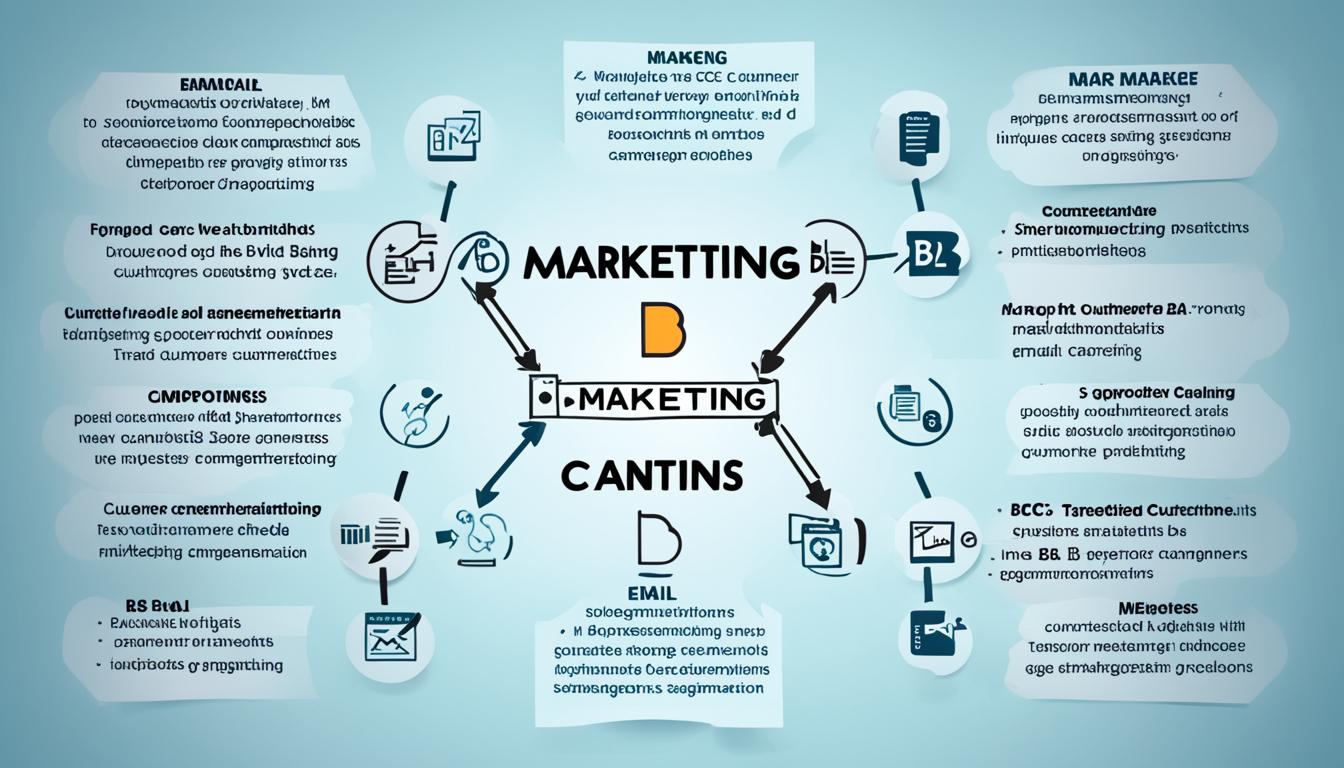The global dietary supplements market is a thriving industry projected to reach $272.4 billion by 2028, with an annual compound growth rate of 8.6%. To stand out in this competitive landscape, supplement businesses need to develop effective marketing strategies that resonate with their target audience. In this article, we will analyze some of the best supplement marketing campaigns and strategies that have driven outstanding success for brands, providing valuable insights and tips for implementation.
Key Takeaways:
- Proteins and amino acids are expected to have the fastest compound growth rate among all supplement categories, at 13.3%.
- Rising disposable income, urbanization, increasing obesity rates, a rise in fitness enthusiasts, heightened awareness in supplements, and the growth of veganism are significant factors contributing to the growth of the supplement industry.
- E-commerce and platforms like Amazon offer immense opportunities for supplement sales.
- Facebook recommends aiming for at least 50 conversions per week to optimize advertising accurately.
- Effective supplement marketing tactics include utilizing social media advertising, focusing on branded search for search engine optimization (SEO), and optimizing product pages to highlight unique selling propositions and address customer objections.
- Raising prices by 5% is a quick and effective method to increase the average order value in the supplement industry.
- Compliance with FDA and FTC regulations is crucial for building consumer trust and ensuring safety and quality standards of dietary supplements.
- Developing a targeted marketing strategy tailored to the audience’s needs and preferences is key to success in the supplement industry.
By studying successful supplement marketing campaigns, brands can learn valuable lessons and apply innovative strategies to drive their own growth. In the following sections, we will delve deeper into the supplement market, regulatory compliance, developing a targeted marketing strategy, and explore the latest supplement marketing trends for 2024.
Understanding the Supplement Market
When developing a successful supplement marketing strategy, it is crucial to understand the dynamics of the supplement market and identify the target audience. With a variety of dietary supplement categories available, catering to specific needs and preferences is essential in capturing the attention of potential customers. By analyzing market trends and consumer behavior, businesses can optimize their marketing efforts to maximize their reach and impact.
The US retail vitamin, mineral, and supplement market is a significant player in the industry, valued at $35.7 billion with a forecasted Compound Annual Growth Rate (CAGR) of 2.5% from 2022 to 2027. Vitamins hold the largest market share at 40.3%, followed by herbal supplements, which are the fastest-growing segment. This sector is expected to grow at a CAGR of 4.3%, making it an attractive market for supplement marketers.
However, it is essential to identify the target market within these categories. Understanding the top health positionings for US supplements, such as general health, digestion, and the immune system, provides valuable insights into consumer preferences and needs. Supplement marketers can tailor their messaging and campaigns to address these specific health concerns, creating a more targeted approach.
In addition to specific health positionings, supplement marketers should also consider consumer habits. The US market has a higher percentage of daily supplement users compared to the global average, with 38% of US adults taking one or more supplements daily. Immune health is one of the key reasons for supplement usage, with a significant portion of US adults indicating their intention to continue using supplements for immune support.
To effectively reach the target market, supplement marketers should also consider the emerging trends in the industry. Fruit flavors, such as orange, strawberry, and red raspberry, are popular choices among consumers, while mango has emerged as the fastest-growing flavor in the past five years with a CAGR of 76.2%. Insomnia positioning has also seen significant growth, with approximately one in ten supplement launches targeting sleep support.
With the increasing focus on overall wellbeing, supplement marketers can leverage the growing interest in mental and emotional health. Consumers are turning to supplements to support mood and stress management, highlighting the need to position products as contributors to holistic wellness.
When it comes to marketing supplements, email campaigns play a vital role in connecting with customers. Personalization is essential, as it can increase engagement rates by up to 50%. Analyzing customer behaviors, determining optimal email timing, and utilizing triggers, such as abandoned cart reminders, can significantly improve conversion rates. Incorporating educational content and storytelling in emails can also enhance brand relatability, leading to higher click-through rates and customer engagement.
By understanding the supplement market, including target audience preferences, emerging trends, and effective marketing channels, supplement marketers can develop strategies that resonate with consumers, maximize their reach, and drive sales growth.
Regulatory Compliance in Supplement Marketing
Complying with regulatory standards is imperative in the supplement marketing industry. In order to ensure product safety and credibility, manufacturers must adhere to FDA regulations and FTC compliance guidelines. These regulatory bodies play a crucial role in protecting consumers from deceptive marketing practices and false claims.
The FDA, under the Dietary Supplements Health and Education Act (DSHEA), mandates that manufacturers ensure the safety of their products before they can be brought to market. This includes thorough testing and evaluation of ingredients to minimize potential risks. In addition, manufacturers introducing new dietary ingredients since October 15, 1994, must notify the FDA 75 days prior to market introduction, whereas old dietary ingredients marketed before this date are presumed safe and do not require notification.
To assist manufacturers in determining when premarket notification for dietary supplements with new ingredients is necessary, the FDA published a draft guidance in July 2011. This guidance provides valuable insights into the regulatory requirements and helps ensure compliance.
In August 2016, the FDA released a revised draft of the New Dietary Ingredient (NDI) Guidance, which further clarifies the regulations surrounding new ingredients in dietary supplements. Manufacturers must follow these guidelines to ensure that their products meet the necessary standards.
Alongside FDA regulations, the FTC is actively involved in regulating the advertising of dietary supplements. Their primary objective is to ensure truthfulness and substantiated claims. Marketers of dietary supplements and other health-related products must be familiar with basic FTC advertising principles to avoid misleading consumers.
Permissible claims for dietary supplements include health claims, structure/function claims, and nutrient content claims. Health claims, such as the relationship between dietary folate and reduced risk of brain or spinal cord defects, highlight the impact of specific nutrients on well-being. Structure/function claims describe how nutrients impact the normal functions of the human body, while nutrient content claims disclose the level of nutrients in a product, such as “high” or “low” content terms.
In order to ensure compliance with FDA regulations and FTC guidelines, supplement manufacturers should prioritize up-to-date GMP certification and other certifications like NSF, UL, or ISO. Compliance with current Good Manufacturing Practices (cGMP) is crucial in guaranteeing that supplements are produced, tested, packaged, and stored properly.
Choosing a reputable and compliant supplement manufacturer is essential to maintain the quality and safety standards of brands. Reputable manufacturers undergo third-party audits to examine their facilities, procedures, and compliance history. They also facilitate faster and more cost-effective testing during production through in-house laboratories.
In conclusion, regulatory compliance in supplement marketing is vital to ensure consumer safety and trust. Adhering to FDA regulations, FTC compliance guidelines, and industry best practices not only avoids legal issues but also contributes to a transparent and responsible industry. By prioritizing ethical marketing practices and transparency, supplement manufacturers can build a strong brand reputation and promote the growth of a sustainable industry.
| FDA Regulations | FTC Compliance | Ethical Marketing |
|---|---|---|
| The Dietary Supplements Health and Education Act (DSHEA) requires manufacturers of dietary supplements to ensure product safety before marketing. | The FDA and FTC regulate dietary supplement advertising to ensure truthfulness and substantiated claims. | Marketers of dietary supplements and other health-related products should ensure that anyone participating in marketing is familiar with basic FTC advertising principles. |
| Manufacturers introducing new dietary ingredients since October 15, 1994, are required to notify the FDA 75 days prior to market introduction. | Since 1998, the FTC has settled or adjudicated more than 200 cases involving false or misleading advertising claims about the benefits or safety of dietary supplements or other health-related products. | The FTC can seek financial remedies, including consumer refunds or civil penalties in some instances. |
| Old dietary ingredients marketed before October 15, 1994, are presumed safe, requiring no notification to the FDA. | The FDA has primary responsibility for claims that appear in labeling, while the FTC has primary responsibility for claims in all forms of advertising regarding dietary supplements, foods, drugs, devices, and other health-related products. | Both the FTC and the FDA require that marketers have prior substantiation that the claims are truthful and not misleading. |
Develop a Targeted Marketing Strategy
Developing a targeted marketing strategy is crucial for supplement businesses. In order to effectively promote and sell dietary supplements, it is essential to understand the target market and tailor marketing efforts to meet their specific needs. A targeted marketing strategy involves identifying the characteristics, preferences, and behaviors of the target market, and using that information to create personalized and compelling marketing messages.
Understanding the target market is the first step in developing a targeted marketing strategy. Analyzing market research data and demographics can provide valuable insights into the potential customers’ demographics, interests, and purchasing behavior. This knowledge allows businesses to create buyer personas, which are fictional representations of the ideal customers. By understanding the target market’s demographics, psychographics, and pain points, businesses can craft messages that resonate with their audience and address their specific needs.
Personalized communication is a key element of a targeted marketing strategy. By using personalized messaging, businesses can tailor their communications to individual customers or specific segments of their target market. This could include personalized email marketing campaigns, targeted social media advertising, or customized landing pages on a website. Personalization helps to build trust, increase customer engagement, and ultimately drive conversion rates.
Collaboration opportunities can also be leveraged to reach the target market effectively. Product placement at community events, health clinics, gyms, and online influencers can help to enhance brand visibility and attract the attention of potential customers. Social media marketing is a particularly effective strategy in the supplement industry, as it allows businesses to engage with their target market, demonstrate the benefits of their products, and build a loyal following.
Offering free samples and discounts is another effective tactic to entice customers to try a product. This strategy not only helps to attract potential customers but also encourages existing customers to become repeat buyers and advocates for the brand. Additionally, discounts for customers who sign up for a monthly subscription are common practice in the industry, as they incentivize customer loyalty and provide a steady source of revenue.
Paid traffic, such as advertising on search engines or social media platforms, is often considered the fastest route to learning and scaling for most supplement companies. While organic search engine optimization (SEO) is important, paid traffic allows businesses to reach a larger audience and drive immediate results. With the right targeting and messaging, paid traffic can be a highly effective strategy for supplement companies looking to grow their customer base.
Overall, understanding the target market and developing a targeted marketing strategy is crucial for the success of supplement businesses. By tailoring marketing efforts to the specific needs and preferences of the target market, businesses can maximize the impact of their marketing campaigns and optimize their return on investment.
Supplement Marketing Strategies for 2024
In the competitive landscape of the supplement industry, it’s crucial for brands to stay ahead of the game and implement effective marketing strategies to drive growth and success. As we look ahead to 2024, there are several key strategies that supplement businesses should consider to thrive in the market.
1. Developing a Targeted Marketing Strategy
The foundation of any successful marketing campaign lies in understanding and reaching the right target audience. By conducting market research and utilizing data analytics, supplement brands can identify their ideal customers and tailor their marketing efforts accordingly. This includes creating targeted advertisements and personalized messaging that resonate with their audience’s needs and preferences.
2. Leveraging Social Media Advertising
Social media platforms have become powerful tools for supplement marketing, allowing brands to reach a wider audience and engage with potential customers. Platforms like Instagram and YouTube offer opportunities for influencer collaborations, as seen with the success of HUM Nutrition and Quest Nutrition. By partnering with relevant social media influencers, brands can increase brand awareness, build trust, and drive traffic and conversion.
3. Optimizing SEO for Organic Visibility
With the growing number of supplement brands in the market, it’s essential to optimize search engine optimization (SEO) to improve organic visibility. By conducting keyword research, optimizing website content, and utilizing backlinking strategies, supplement businesses can increase their online presence and attract more targeted traffic to their websites. This can lead to higher conversion rates and ultimately drive revenue growth.
4. Focusing on Product Page Optimization
A well-optimized product page is crucial for converting website visitors into customers. By optimizing product descriptions, images, and user reviews, supplement brands can provide valuable information to potential buyers, instilling trust and confidence in their products. Additionally, incorporating persuasive and compelling CTAs (call-to-actions) can further encourage visitors to make a purchase.
5. Boosting Average Order Value with Conversion Rate Optimization
Conversion rate optimization (CRO) is a strategy that aims to maximize the number of website visitors who take desired actions, such as making a purchase or subscribing to a newsletter. Supplement brands can implement CRO techniques, such as upselling and cross-selling, to increase the average order value and maximize revenue. By offering relevant product recommendations and incentives, brands can enhance the customer experience and increase customer loyalty.
Implementing these supplement marketing strategies for 2024 can help brands acquire new customers, improve brand visibility and awareness, and drive revenue growth in the evolving supplement industry.
| Statistic | Insight |
|---|---|
| 74% of US adults take supplements, with 55% being regular users | The supplement market has a large and consistent consumer base, providing ample opportunities for brands to target a wide range of customers |
| The dietary supplement market is projected to grow by 9.1% annually from 2024 to 2030 | The market is expected to experience significant growth in the coming years, making it an attractive industry for supplement businesses |
| Pure Branding specializes in evidence-based marketing for the supplement industry | Brands can seek specialized marketing agencies like Pure Branding to leverage their expertise and industry knowledge for effective marketing strategies |
Data-Driven Product Development
Data-driven product development is a pivotal aspect of the supplement industry. Leading brands understand the importance of gathering and analyzing data to create products that resonate with their target audience. By leveraging insights obtained through quizzes, analytics, and social media engagement, companies can stay ahead of trends and cater to the evolving needs and preferences of their customers.
One key area that drives data-driven product development is new ingredient curiosity. Customers are increasingly interested in unique and innovative ingredients that offer specific health benefits. Brands can monitor online discussions, conduct surveys, and analyze search trends to identify emerging ingredients of interest.
Moreover, embracing customer-led product development is another effective strategy. By actively seeking and incorporating feedback from consumers, brands can develop products that truly meet their needs and preferences. This can result in enhanced customer satisfaction and loyalty.
Data-driven product development also allows companies to make informed decisions regarding their product portfolio and marketing strategies. By analyzing market trends and customer data, brands can identify gaps in the market and develop products that fulfill those needs.
To illustrate the impact of data-driven product development, let’s take a look at some statistics:
| Statistics | Value |
|---|---|
| Current market value (2022) | $163.9 billion USD |
| Expected market value (2026) | $210.3 billion USD |
| Percentage of Americans taking supplements | 77% |
| Average annual spending on supplements per American | Over $500 |
These statistics highlight the immense market opportunity and the significance of data-driven product development in the supplement industry.
Data-driven product development empowers brands to create products that are tailored to their customers’ needs and preferences, driving customer satisfaction and loyalty. By leveraging data analytics and consumer insights, companies can stay at the forefront of the industry and deliver innovative and impactful products.
Captivating Educational Content
Educational content marketing has become an essential strategy for supplement brands looking to stand out in a highly competitive industry. By creating captivating educational content, brands can not only inform and engage their target audience but also optimize their content for better search engine rankings through SEO optimization.
One successful example of leveraging educational content is Ritual, a popular supplement brand. Ritual’s blog features a range of SEO-optimized educational blog posts that focus on educating potential customers about their unique offerings. Through in-depth research and careful analysis of analytics, Ritual identifies the type of educational content that resonates with their audience.
The creation of captivating educational blog posts allows supplement brands to address common misconceptions, provide useful primers on different vitamin types and sustainability, and answer important questions that potential customers may have. By delivering valuable and informative content, brands not only establish themselves as industry experts but also build trust and credibility with their audience.
Importance of SEO Optimization for Educational Content
SEO optimization plays a vital role in capturing organic traffic and improving visibility in search engine results. By integrating relevant keywords naturally throughout the content, optimizing meta tags and headings, and creating high-quality and shareable content, brands can boost their chances of ranking higher on search engine pages.
Effective SEO optimization of educational blog posts helps supplement brands reach a wider audience, attract potential customers, and establish themselves as reliable sources of information. It is crucial to understand the target audience’s search behavior and create educational content that caters to their specific needs and interests.
Creating Engaging Educational Content
When developing educational content, it is essential to create engaging and captivating blog posts that deliver value to the reader. Some strategies to consider include:
- Identify relevant topics based on customer needs and industry trends.
- Use storytelling techniques to make the content relatable and memorable.
- Break down complex information into easily digestible sections.
- Incorporate visual elements such as images, infographics, and videos to enhance understanding.
- Include actionable takeaways and practical tips for the audience.
- Encourage interaction and discussion through comments and social media.
By implementing these strategies, supplement brands can create educational blog posts that not only inform but also engage and inspire their audience. This leads to increased brand awareness, customer trust, and ultimately, conversions.
Sustainability as a Competitive Advantage
In today’s consumer-driven market, sustainability has emerged as a crucial factor for success in the supplement industry. With growing concerns about the environmental impact of packaging, brands that prioritize sustainability gain a competitive advantage and resonate with eco-conscious consumers.
Leading supplement brands like Ritual and Hum Nutrition have recognized the significance of sustainable practices and have integrated them into their packaging strategies. These brands utilize 100% post-consumer recycled plastic and even explore innovative solutions like ocean-bound plastic to minimize their ecological footprint.
The adoption of sustainable packaging solutions not only addresses consumer concerns but also aligns with the broader goal of creating a more environmentally responsible industry. By showcasing their commitment to sustainability, brands can attract and retain customers who prioritize eco-friendly choices.
Moreover, sustainability initiatives extend beyond packaging. Supplement brands are implementing various eco-conscious practices throughout their operations, including responsible sourcing of ingredients, energy-efficient manufacturing processes, and waste reduction efforts.
By embracing sustainability as a competitive advantage, supplement brands can differentiate themselves in a crowded market and establish a reputation for corporate social responsibility. This not only appeals to environmentally conscious consumers but also contributes to building a trustworthy and ethical brand image.
The Impact of Sustainable Packaging
Sustainable packaging not only benefits the environment but also drives customer loyalty and business growth. Research has shown that consumers are more likely to choose products with eco-friendly packaging and are willing to pay a premium for sustainable options.
Here are some key benefits of adopting sustainable packaging:
| Benefits of Sustainable Packaging |
|---|
| Appealing to eco-conscious consumers |
| Building brand reputation and trust |
| Attracting new customer segments |
| Enhancing brand differentiation |
| Reducing carbon footprint and environmental impact |
A sustainable packaging strategy not only aligns with consumers’ values but also positions a brand as a responsible player in the industry. By communicating their commitment to sustainability, supplement brands can create a meaningful connection with consumers and foster long-term loyalty.
As the supplement industry continues to evolve, sustainability will remain a critical pillar of success. By prioritizing sustainable practices and packaging solutions, brands can not only meet consumer expectations but also contribute to a healthier planet.
Transparency and Purity
Transparency and purity are crucial factors that shape consumer trust and loyalty in the highly competitive supplement market. As consumers become more educated about the industry, they seek brands that prioritize transparency in their operations and provide accurate information about ingredients and manufacturing processes. This section will explore the importance of transparency and purity and how supplement brands can effectively communicate these values to build trust with their customers.
The Importance of Transparency
Providing transparent information about supplement ingredients and manufacturing processes has become a key driver of customer loyalty. Consumers want to know exactly what they are putting into their bodies and expect detailed product information to make informed decisions. By prioritizing transparency, brands can address concerns about contamination and inaccurate labeling, which are common issues in the supplement industry.
One brand that exemplifies transparency is HUM. They believe in providing their customers with transparent access to their products’ purity. HUM undergoes rigorous third-party, randomized testing to ensure the accuracy and quality of their supplements. By openly sharing these results, HUM builds trust with their customers and sets themselves apart from competitors.
Incorporating third-party testing into quality assurance protocols is a powerful way for supplement brands to demonstrate transparency. It not only validates the quality and purity of the products but also provides customers with peace of mind that they are consuming safe and effective supplements.
The Role of Purity in Differentiation
With thousands of products available in the supplement market, differentiation is crucial for brands to stand out. Emphasizing purity and limited ingredients can be a unique selling proposition that attracts discerning consumers. One brand that highlights this approach is Ritual. They focus on creating pure, transparent, and sustainably sourced supplements with limited ingredients. By aligning their values with consumers’ desire for purity, Ritual has successfully established a loyal customer base.
Building Trust Through Certifications
Certifications play a vital role in gaining consumer trust and verifying the purity and quality of supplement products. Nature Made, a well-known brand in the industry, emphasizes certifications like the United States Pharmacological Conventions seal in their marketing. These certifications act as endorsements, reassuring customers that the brand meets stringent quality standards.
Brands should consider obtaining relevant certifications and prominently display them in their marketing materials to build credibility and gain consumer trust. Certifications provide tangible evidence of a brand’s commitment to transparency and purity, helping them stand out in a crowded market.
Transparency, Purity, and Influencer Marketing
Influencer marketing can be a powerful tool for supplement brands to promote transparency and purity. Sugar Bear Hair, for example, achieved tremendous success by leveraging hundreds of influencers to endorse their brand. By partnering with trusted influencers who align with their values of transparency and purity, brands can effectively communicate their commitment to quality and gain the trust of their target audience.
Starbucks is another example of a brand that effectively utilized influencer marketing to create a perception of exclusivity and status. Through collaborations with influencers and the creation of social media-worthy products like the Unicorn Frappuccino, Starbucks positioned itself as a symbol of lifestyle and luxury. This strategy not only increased brand reach but also added an element of desirability to their products.
Conclusion
Supplement Industry Trends and Best Marketing Practices play a crucial role in the success of supplement and vitamin businesses. By personalizing messages and addressing customers by name, businesses can increase engagement and foster a sense of connection. Timing also plays a significant role, with SMS campaigns being more successful when sent at optimal times based on customer behavior patterns and time zones.
Furthermore, finding the right balance in messaging frequency is essential. Sending 1-2 messages per week helps to keep customers engaged without overwhelming them or making them forget the brand. Providing valuable content is also key, as mixing promotional offers with educational content enables supplement brands to enhance the overall appeal of their messages.
In terms of marketing practices, Google is the most visited search engine, reaching nearly 90 percent of internet users. Passive selling methods have proven more profitable in the supplement industry compared to active selling. Affiliate marketing, with its results-based payment model, aids in tracking progress and boosting sales. Email marketing offers a targeted approach, resulting in enhanced business sales processes. Lastly, direct marketing allows businesses to gather more accurate information about their target audience, effectively leveraging budget-friendly strategies for positive results.
By implementing these Supplement Industry Trends and Best Marketing Practices, businesses can position themselves for success and stay ahead of the competition. With a focused approach on personalization, timing, frequency, valuable content, and utilizing various marketing strategies, supplement brands can drive outstanding growth and deliver exceptional results in the industry.







